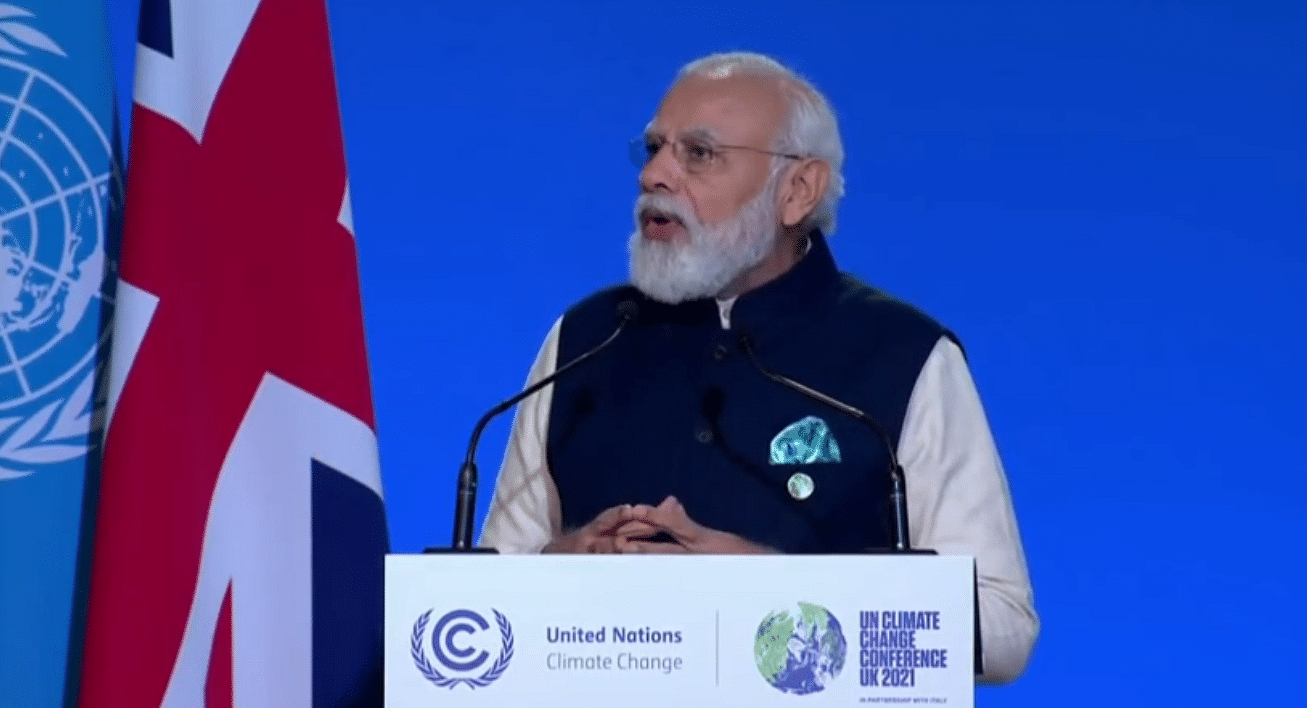
Prime Minister Narendra Modi on Monday pledged 2070 as the year for India to achieve the “Net Zero” commitment, adding another twenty years to the rich nations’ aspiration of reaching such a milestone by the middle of the 21st century.
The Prime Minister’s announcement of becoming carbon neutral by 2070 at the 26th Conference of Parties to the UN Framework Convention on Climate Change at Glasgow showed India’s ambition when it comes to fighting climate change despite being a developing country, officials said.
The Indian deadline is ten years more than the Chinese plan to achieve the same while the USA and European Union had pledged to attain such a milestone by 2050.
Sharing a five-point action plan, Modi said by 2030 India would fulfill 50% of its energy requirements from renewables and would have 500 GW of energy from non-fossil sources instead of the current target of 450 GW.
Moreover, New Delhi will also reduce one billion tonnes of carbon emissions from the total projected emissions by 2030 and slash the carbon intensity of the economy by 45%.
Other future plans include turning the Indian Railway, the world’s largest railway carrier to become Net Zero by 2030 saving 60 million tonnes of emission each year. Also nearly 40 billion tonnes of emission are being cut by using the LEDs.
Addressing the world leaders, Modi said just like India raising its ambition in setting new climate goals, the rich nations also need to raise their ambitions in climate finance and tech transfer. The world cannot achieve newer targets with old goals of climate finance.
Responding to the criticisms of India contributing to the greenhouse gas emission load, Modi said India’s contribution in climate change mitigation far outstripped its role in emissions. India which has around 17 per cent of the world’s population is responsible for only about 5 per cent of the total emissions.
The Prime Minister earlier sought international support for “local adaptation” of climate resilient practices in government schemes benefiting the common man, asserting that support for vulnerable communities to adapt to the dangerous consequences of climate change must be global.
"Adaptation has not received the kind of importance in global climate debate that mitigation has. This is an injustice to those developing nations that are more impacted by climate change. We will need to make adaptation the key component of our development policies and projects,"
Climate change mitigation means avoiding and reducing emissions of heat-trapping greenhouse gases into the atmosphere to prevent the planet from warming to more extreme temperatures, says a WWF report.
This is easy to understand but difficult to accomplish because the greenhouse gases have a long residence time in the atmosphere..
Adaptation, on the other hand, means altering human behaviour and systems to protect the people, economies, and the environment. While it’s easier to adapt if emissions come down, adapting to a changed environment requires long term funding support and policy back up.
"Just like in India, climate is a big challenge for the agriculture sector for most developing countries. There are changes in the cropping patterns, untimely rains and floods, or crops are destroyed by regular typhoons," he said, asking the world leaders to join the Coalition to Disaster Resilient Infrastructure that was proposed by Modi in 2016 and established in 2019 in New Delhi.
Check out latest DH videos here
